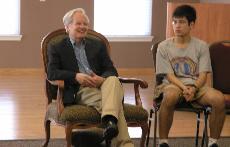“He rocks my foxy world,” said an enthusiastic Eric Mortensen, Assistant Professor of Religious Studies, following Bill Moyers’ lecture. The audience gave a standing ovation after Bill Moyers’ March 13 speech at War Memorial Auditorium. Moyers spoke about religion, the environment and their connection.
“It was one of the best speeches I’ve heard,” said sophomore Colin Bussiere-Nichols. “It had a radical and inspirational message that related to me and my life.”
President Kent Chabotar introduced Moyers and highlighted the journalist’s lengthy list of accomplishments, including service as Deputy Director of the Peace Corps, special assistant to U.S. President Lyndon B. Johnson, and White House Press Secretary. Moyers was also a publisher for Newsday, formed Public Affairs Television with his wife Judith Davidson, and hosted the PBS series NOW with Bill Moyers.
After his long list of achievements was recited, Moyers stepped up to the podium and began his discussion of religion. “The story of Noah is a controversial one,” Moyers said. “He knew in advance about the flood. Why didn’t he warn others?”
Moyers said many would argue that Noah was just being faithful and obedient to God, but that this raises further questions about the appropriateness of blind faith. Moyers compared the biblical flood to the story of Oskar Schindler. Schindler was a philanthropic playboy, but helped save many Jews during the Holocaust. Most Germans had blind faith and ignored atrocities being committed.
Schindler would have been drowned by God’s flood, while the faithful Germans would have lived.
Moyers extended Noah’s controversy even further by connecting it to modern-day America. He said he worries that there is too much blind faith and not enough concern in our citizens.
Moyers shifted his focus to the environment for the second half of his lecture. He focused on the overlooked problem of global warming.
“When I was younger, I truly believed we were on our way to a third American revolution where people would take strides towards environmentalism,” Moyers said. “It was only a reverie.”
“The U.S. has become a recalcitrant and backsliding naysayer,” Moyers said. “(President Geore W.) Bush is willing to jump into a war using information that’s faulty at best, but he refuses to do anything about global warming despite all the documentation on its gravity.”
Moyers’ unabashed attitude impressed members of the audience.
“I appreciated his willingness to be straightforward,” said senior Julia Hood. “He didn’t present a rosy version of the story to please everyone.”
Moyers used the movie “The March of the Penguins” to show the lack of attention global warming receives. The 2005 documentary details the dangerous conditions Emperor penguins must endure in Antarctica to reproduce. Moyers said that conservatives are using the film as a mascot for their agendas.
“Pro-life supporters say that it shows the value of life,” Moyers said. “Marriage proponents say it shows the value of monogamy. … Right-wing Christians say it serves as a case for intelligent design. Nobody, however, uses it as a case for global warming.”
“These birds depend on the frigid temperature to maintain the delicate balance of the process, but the director didn’t want to explore the issue for fear that it would push the comfort zones of his audience,” Moyers said.
Moyers ended the lecture on an encouraging note that he referenced again during the question and answer session:
“You need to go out and do something political that joins you in an action that has a chain reaction. You have to do precinct politics again. You have to take back this country.

